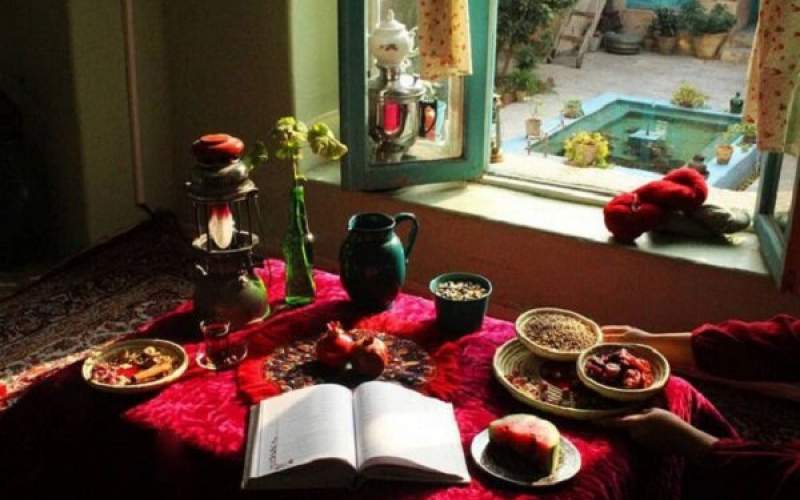The Iran Project
: Shab-e-Yalda (Yalda Night), also known as Shab-e Chelleh, is one of the most ancient Persian festivals annually celebrated on December 21 by Iranians all around the world.
Thursday 21 December 2023 - 14:10
Story Code : 409408
Source : Mehr News
On "Yalda Night"
Let's celebrate living one more minute together
On Shab-e-Yalda, people gather in groups of friends or families, usually at the home of grandparents or the elderly, to pass the longest night of the year happily by eating nuts and fruits, reading Hafiz poems, making good wishes, talking and laughing all together to give a warm welcome to winter, and a felicitous farewell to autumn.
Yalda means “birth”, and Yalda night refers to the longest night of the year or winter solstice. Yalda or Chella was inscribed in 2022 on the Representative List of the Intangible Cultural Heritage of Humanity.
People on Yalda Night are usually served with fresh fruits and colourful Ajil (a mixture of dry fruits, seeds, and nuts) in floral bowls.
To Iranians, fruits are reminders of abundance in summer. Watermelon and pomegranates, as symbols of bounty, are the traditional fresh fruits of this night. It is believed that eating watermelon before the arrival of winter can immunize the body against illness.
Let's celebrate living one more minute together
Yalda night refers to a time between the sunset of autumn’s last day (the 30th of Azar in the Iranian calendar equal to the 21st of December) and the sunrise of the first day of winter (the 1st of Dey in the Iranian calendar equal to the 22nd of December).
Yalda Night, both before and after Islam, has a special place in Iranian culture and has always been considered a motivation for gathering close and distant relatives. The festivities that take place on this night are an ancient tradition.
Rituals of Yalda Night in different cities
Yalda Night ritual is held in different cities of Iran based on the city's culture and geography, each of which has its own charms; However, some of them have been forgotten and only a memory of them remains.
Zanjan is among the few places where ‘Korsi’ has still practical usage; and wherever there is a Korsi, there will be a memorable gathering. On Yalda, local people serve their own local sweets including the famous window-shaped pastries and baklava.
In Tabriz, street musicians known as “Ashiq” walk around neighborhoods while singing, playing music, and telling legends and stories.
An old custom still rehearsed in eastern parts of the country (Khorasan) is the preparation and consumption of "Kaf", which is a sort of sweet that looks like foam.
The beauty of Yalda in the Lorestan Area starts right after the sunset when young people would go to the neighbors’ rooftops and start singing the “Shov-e Avval-e Qāreh” song, where they would hang a scarf from the rooftop of the neighbor’s house, asking them for treats.
In the north of Iran, in the district of Gilan, Sabzi Polo Maahi is the dish of Yalda night, which is a dish of rice and chopped herbs, along with whitefish or smoked fish.
In Shiraz, the special dish of this night is Havij Polo, carrot rice mostly served with chicken and Persian roasted saffron, or Kalam Polo, which is a very famous Shirazi dish made with rice and cabbage.
Each city in Iran celebrates this night by eating the typical food in their town. The main ingredients for Shabe Chelleh food are pomegranates or walnuts. In Qazvin, the people eat Anar Polo (pomegranate rice), and in Mazandaran, they eath Nardoon (pomegranates) Stew.
On this night, the people of Kerman gather in the big house of each family, spread a tablecloth on pateh on a Kerman rug, and place the poshtis adorned with pateh around the room.
In the middle of the table, they put a dish of pistachios, watermelon, black pomegranates from the surrounding villages, kalempe (traditional sweet of Kerman), qovatu coffee, and other snacks.
The people of Kermanshah eat fruits on this night which are a symbol of the sun; Such as red watermelon, red pomegranate, red apple, or yellow lemon. They also tell stories of the eternal love of Shirin and Farhad, Rostam and Sohrab, the story of Hussein Kurd Shabestari, and the recitation of beautiful and pleasant poems by Shami Kermanshahi.
In recent years some charities initiated some campaigns inviting Iranians to prepare food aid packages for needy families who can not afford the costs of Yalda night.
Except for Iran, Yalda Nights, or winter solstice, is celebrated in other countries, including Afghanistan, Pakistan, Tajikistan, East Asia, Scotland, Africa, Bolivia, Peru, Ecuador, and Russia, with different rituals, foods, and traditions.
Reporter : Editorial of The Iran Project
# Tags











